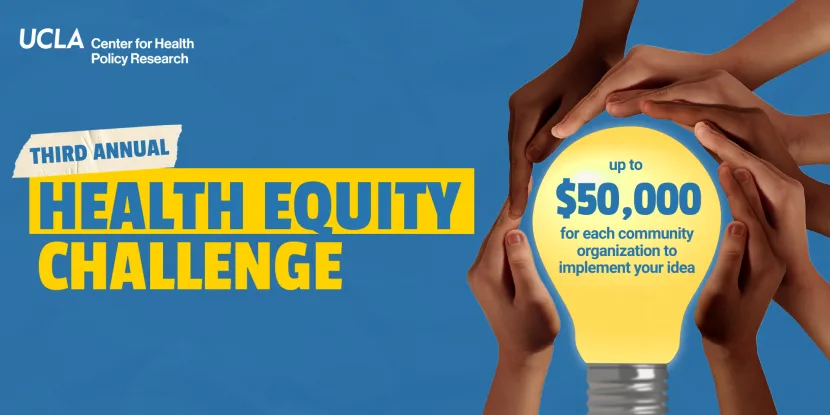Are you a UCLA graduate student with an original idea for improving health equity? Do you want to help a community organization win $50,000 to make your project come to life?
The UCLA Center for Health Policy Research (CHPR) is proud to present the third annual Health Equity Challenge, an exciting opportunity for students to turn their ideas into action and develop innovative solutions that a community-based organization can implement.
UCLA graduate students are invited to submit a two-page application that identifies a current health equity issue in Los Angeles, San Bernardino, or Riverside counties and a short description of an innovative intervention that could be implemented by a local community-based organization.
Proposals can include direct interventions, program development, policy changes, or other innovative ideas. Graduate students from all disciplines are encouraged to apply, including: public health, policy, education, law, urban planning, psychology, medicine, sciences, business, and more.
Applications are due by Monday, November 6, 2023. An information session will be held on Monday, October 23, from noon to 1 p.m. on Zoom to answer any questions you may have.
“If you are a UCLA graduate student who wants to create change in your community, the UCLA Health Equity Challenge is the perfect opportunity for you,” said Kathryn Kietzman, PhD, director of CHPR’s Health Equity Program. “Whether you’re a student in tech who wants to create an app to help undocumented Californians navigate the benefits process, an urban planning student looking to use your skills to revitalize a park in an at-risk community, or someone who wants to help create a peer support program for LGBTQ+ youth, we are looking for students who are passionate, creative, and ready to help solve some of our most challenging problems.”
Up to 15 students will be named finalists and will participate in the full competition. Each student will receive a $2,500 stipend and over the course of 12–15 weeks, identify and work with a faculty or community mentor, participate in trainings, write a blog, select a community organization that can implement the project, create a poster, and develop a full project proposal.
Projects must be feasible, innovative, and have measurable outcomes to assess desired improvements in the identified community health issue.
Visit the Health Equity Challenge website to learn more.







